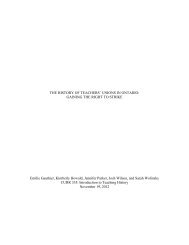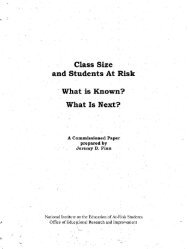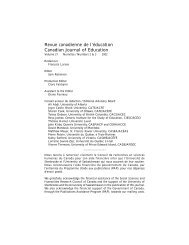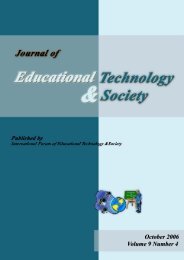Student Engagement: What do we know and what should we do?
Student Engagement: What do we know and what should we do?
Student Engagement: What do we know and what should we do?
You also want an ePaper? Increase the reach of your titles
YUMPU automatically turns print PDFs into web optimized ePapers that Google loves.
school culture if students underst<strong>and</strong> <strong>what</strong> is going on, <strong>and</strong> are given some significant<br />
role in helping to design <strong>and</strong> bring about the desired culture change” (p. 12). Projects like<br />
Imagine a School… <strong>and</strong> Design for Learning <strong>and</strong> <strong>What</strong> did you <strong>do</strong> in school today?<br />
already impact definitions <strong>and</strong> measures of student engagement in the literature, but more<br />
clarification <strong>and</strong> discussion is required before <strong>we</strong> can fully underst<strong>and</strong> this complicated,<br />
evolving construct that seems to show such promise for creating the educational<br />
experiences <strong>and</strong> outcomes students require to be successfully engaged.<br />
Perhaps in addition to student voice, <strong>we</strong> <strong>should</strong> add “parent” voice. We noted there was<br />
little to no reference to the role parents can play to increase student engagement to<br />
classroom learning, with the exception that most research studies on engagement state<br />
that student background might impact their levels of engagement. Certainly other<br />
research on socio-economic factors, education levels of parents, <strong>and</strong> general attitude<br />
about education in the home have been found to impact student’s levels of engagement in<br />
school. Perhaps this omission of parental voice suggests that researchers believe parents<br />
are beyond the scope or realm of influence for teachers <strong>and</strong> educators.<br />
If <strong>we</strong> <strong>do</strong> not exp<strong>and</strong> our research <strong>and</strong> thinking about student engagement, <strong>we</strong> fall victim<br />
to traditional views that education is something that happens only in school; <strong>and</strong>, until <strong>we</strong><br />
modify or eradicate this limited view of how children learn, most of our work in the area<br />
of student engagement will fall short. If <strong>we</strong> have learned nothing else from our review of<br />
research literature, it is that learning involves <strong>what</strong> happens in learners’ entire lives – not<br />
just school, <strong>and</strong> not just home – everywhere. This message seems central to our emerging<br />
insights about <strong>what</strong> will engage our children in learning.<br />
<strong>Student</strong> <strong>Engagement</strong>: <strong>What</strong> <strong>do</strong> <strong>we</strong> <strong>know</strong> <strong>and</strong> <strong>what</strong> <strong>should</strong> <strong>we</strong> <strong>do</strong>? 52












